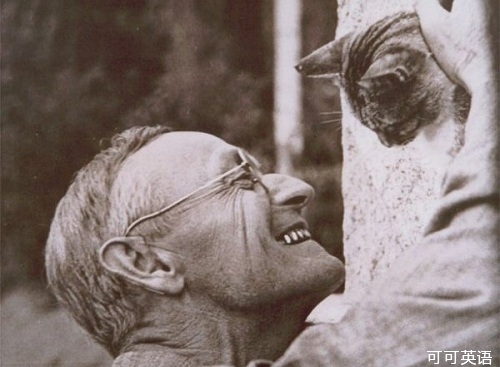(单词翻译:单击)
名著阅读
Before the city, in a beautifully fenced grove, the traveller came across a small group of servants, both male and female, carrying baskets. In their midst, carried by four servants in an ornamental sedan-chair, sat a woman, the mistress, on red pillows under a colourful canopy. Siddhartha stopped at the entrance to the pleasure-garden and watched the parade, saw the servants, the maids, the baskets, saw the sedan-chair and saw the lady in it. Under black hair, which made to tower high on her head, he saw a very fair, very delicate, very smart face, a brightly red mouth, like a freshly cracked fig, eyebrows which were well tended and painted in a high arch, smart and watchful dark eyes, a clear, tall neck rising from a green and golden garment, resting fair hands, long and thin, with wide golden bracelets over the wrists.
Siddhartha saw how beautiful she was, and his heart rejoiced. He bowed deeply, when the sedan-chair came closer, and straightening up again, he looked at the fair, charming face, read for a moment in the smart eyes with the high arcs above, breathed in a slight fragrant, he did not know. With a smile, the beautiful women nodded for a moment and disappeared into the grove, and then the servant as well.
Thus I am entering this city, Siddhartha thought, with a charming omen. He instantly felt drawn into the grove, but he thought about it, and only now he became aware of how the servants and maids had looked at him at the entrance, how despicable, how distrustful, how rejecting.
I am still a Samana, he thought, I am still an ascetic and beggar. I must not remain like this, I will not be able to enter the grove like this. And he laughed.
The next person who came along this path he asked about the grove and for the name of the woman, and was told that this was the grove of Kamala, the famous courtesan, and that, aside from the grove, she owned a house in the city.
Then, he entered the city. Now he had a goal.
Pursuing his goal, he allowed the city to suck him in, drifted through the flow of the streets, stood still on the squares, rested on the stairs of stone by the river. When the evening came, he made friends with barber's assistant, whom he had seen working in the shade of an arch in a building, whom he found again praying in a temple of Vishnu, whom he told about stories of Vishnu and the Lakshmi. Among the boats by the river, he slept this night, and early in the morning, before the first customers came into his shop, he had the barber's assistant shave his beard and cut his hair, comb his hair and anoint it with fine oil. Then he went to take his bath in the river.
When late in the afternoon, beautiful Kamala approached her grove in her sedan-chair, Siddhartha was standing at the entrance, made a bow and received the courtesan's greeting. But that servant who walked at the very end of her train he motioned to him and asked him to inform his mistress that a young Brahman would wish to talk to her. After a while, the servant returned, asked him, who had been waiting, to follow him conducted him, who was following him, without a word into a pavilion, where Kamala was lying on a couch, and left him alone with her.
"Weren't you already standing out there yesterday, greeting me?" asked Kamala.
"It's true that I've already seen and greeted you yesterday."
"But didn't you yesterday wear a beard, and long hair, and dust in your hair?"
"You have observed well, you have seen everything. You have seen Siddhartha, the son of a Brahman, who has left his home to become a Samana, and who has been a Samana for three years. But now, I have left that path and came into this city, and the first one I met, even before I had entered the city, was you. To say this, I have come to you, oh Kamala! You are the first woman whom Siddhartha is not addressing with his eyes turned to the ground. Never again I want to turn my eyes to the ground, when I'm coming across a beautiful woman."
Kamala smiled and played with her fan of peacocks' feathers. And asked: "And only to tell me this, Siddhartha has come to me?"
"To tell you this and to thank you for being so beautiful. And if it doesn't displease you, Kamala, I would like to ask you to be my friend and teacher, for I know nothing yet of that art which you have mastered in the highest degree."
At this, Kamala laughed aloud.
在城郊一座围着篱笆的美丽林苑旁,这个流浪汉遇见了一小群男女仆人,手里都提着篮子。中间是一乘四人抬的装饰华丽的轿子,轿里有一个女人,在色彩鲜艳的遮阳篷下端坐于红色坐垫上,她显然是女主人。席特哈尔塔在林苑的大门口停下,观看这一行人走过,看见了男仆、女佣和篮子,看见了轿子,也看见了轿子里的贵妇人。在高高耸起的乌发下面,他看见了一张十分开朗、十分娇柔和十分聪慧的脸,鲜红的脸就好像一枚新剖开的无花果,眉毛被修整描画成高高的弧形,乌黑的眼睛聪明而机警,光洁细长的脖子从绿金两色的上衣中伸出,白皙的手修长秀气,手腕上戴着宽宽的金镯子。
席特哈尔塔看见她这么美丽,心里十分欢喜。轿子走近了,他深鞠一躬,然后直起身,又望着那张亮丽可爱的脸,朝那双聪明的圆圆大眼盯视了一会儿,嗅到了一股从没闻过的香气。那个俏丽的女人微笑着点点头,一会儿就消失在林苑时里不见了,身后跟着那些仆人。
我走进这个城市,席特哈尔塔心想,想不到竟碰上这样一个可爱的标志。他真想立刻就走进林苑去,可是他沉吟了一下,猛然意识到那些男女仆人在大门口是怎样打量他的,态度是多么轻蔑,多么狐疑,多么不客气。
我还是个沙门呢,他想,依然是苦行僧和乞丐。我可不能这么站在这儿,也不能走进林苑去。他笑了。
他向路上走过来的一个人打听这个林苑以及那位贵妇人的名字,了解到这是名妓卡玛拉的林苑,除了这个林苑之外,她在城里还另有一幢房子。
然后,他进了城。他现在有了一个目标。
他追随着自己的目标出没于这个城市,在大街小巷奔走,静静地站在广场,在河边的石阶上歇息。傍晚时分,他认识了一个理发馆的伙计,先是看见他在一个拱门的暗影里干活儿,接着又碰上他在一个毗瑟(上奴下手)寺庙里祈祷,他给那伙计讲述了毗瑟(上奴下手)和吉祥天女的故事。当天夜里,他睡在河边的小船旁。第二天清早,在第一批顾客光顾之前,他主让那个伙计给他刮了胡子,剪了头发,并且梳理好,还抹上了头油。然后,他又去河里洗了澡。
下午,当美丽的卡玛拉又坐着轿子走进林苑时,席特哈尔塔站在大门口向她鞠躬行礼,当然,他也得到了这位名妓的问候。他向走在队列末尾的仆人示意,请他报告女主人,就说有个年轻的婆罗门要跟她谈谈。过了一会儿,那个仆人回来,叫席特哈尔塔随他进去,然后就默默地领着他走进了一个楼阁,卡玛拉正靠在一张沙发床上,仆人留下他走开了。
“你不就是昨天站在大门口向我问好的那个人吗?”卡玛拉问。
“是的,我昨天见到了你,和你打了招呼。”
“可你昨天不是留着胡子和头发,头发上也满是灰尘吗?”
“你看得真仔细,把什么都看到了。你看到的人叫席特哈尔塔,婆罗门之子,离开家乡当沙门,已当了三个沙门。可是现在,我已经离开了那条路,来到这座城市,而我在进城前碰到的第一个人就是你。哦,卡玛拉,我来找你就是要告诉你这一点!你是使席特哈尔塔不再低垂眼睛说话的第一个女人。今后,我要是遇见漂亮的女人,再也不会低垂眼睛了!”
卡玛拉微微一笑,手里耍弄着她那把孔雀毛扇子,问道:“席特哈尔塔,你来见我,难道就是为了跟我说这个?”
“是为了跟你说这个,也为了感谢你长得这么漂亮。要是你不嫌弃的话,卡玛拉,我想请你做我的朋友和老师,因为我对艺术一窍不通,而你却是这方面的大师。”
卡玛拉听罢大声笑起来。
背景阅读

本书简介:
古印度贵族青年悉达多英俊聪慧,拥有人们羡慕的一切。为了追求心灵的安宁,他孤身一人展开了求道之旅。他在舍卫城聆听佛陀乔答摩宣讲教义,在繁华的大城中结识了名妓伽摩拉,并成为一名富商。心灵与肉体的享受达到顶峰,却让他对自己厌倦、鄙弃到极点。在与伽摩拉最后一次欢爱之后,他抛弃了自己所有世俗的一切,来到那河边,想结束自己的生命。在那最绝望的一刹那,他突然听到了生命之河永恒的声音……经过几乎一生的追求,悉达多终于体验到万事万物的圆融统一,所有生命的不可摧毁的本性,并最终将自我融入了瞬间的永恒之中。
作者简介:
赫尔曼·黑塞(Hermann Hesse,1877.7.2-1962.8.9)德国作家。1923年46岁入瑞士籍。1946年获诺贝尔文学奖。1962年于瑞士家中去世。爱好音乐与绘画,是一位漂泊、孤独、隐逸的诗人。黑塞的诗有很多充满了浪漫气息,从他的最初诗集《浪漫之歌》的书名,也可以看出他深受德国浪漫主义诗人的影响,以致后来被人称为“德国浪漫派最后的一个骑士”。主要作品有《彼得·卡门青》、《荒原狼》、《东方之行》、《玻璃球游戏》等。
主要生平及创作
出生于德国西南部的小城卡尔夫的一个牧师家庭。自幼在浓重的宗教气氛中长大,1891年,他通过“邦试”,考入毛尔布隆神学校。由于不堪忍受经院教育的摧残,半年后逃离学校。这期间他游历许多城市,从事过多种职业。
在比较广泛地接受东西方文化熏陶之后,1904年,黑塞发表了长篇小说《彼得·卡门青特》,一举成名,从此成为专业作家。这一年他与玛丽结婚,移居巴登湖畔,埋头写作,1906年发表了长篇小说《在轮下》。这一时期的创作以浪漫主义诗歌、田园诗风格的抒情小说和流浪汉小说为主,作品洋溢着对童年和乡土的思念之情,充满对广大自然和人类的爱,同时也表现了青年人的精神苦闷与追求。
第一次世界大战后,黑塞的创作发生了明显的变化,他醉心于尼采哲学,求助于印度佛教和中国的老庄哲学,并对荣格的精神分析产生了深厚的兴趣。他试图从宗教、哲学和心理学方面探索人类精神解放的途径。这时期的长篇小说有《克努尔普》(1916)、《德米安》(1919)、《席特哈尔塔》(1922)、《荒原狼》(1927)和《纳尔齐斯与歌尔德蒙》(1930)等。这些书深受西方读者的喜爱,得到极高的评价,其中《荒原狼》曾轰动欧美,被托马斯·曼誉为德国的《尤利西斯》。
30年代后,法西斯在德国猖獗,黑塞对社会前途陷入深深的怀疑与绝望之中,但他仍不倦地从东西方宗教与哲学中寻求理想世界,《东方之行》(1932)、《玻璃球游戏》(1943)正是这一时期追求与探索的结晶。
黑塞被雨果·巴尔称为德国浪漫派最后一位骑士,这说明他在艺术上深受浪漫主义诗歌的影响。他热爱大自然,厌倦都市文明,作品多采用象征手法,文笔优美细腻;由于受精神分析影响,他的作品着重在精神领域里进行挖掘探索,无畏而诚实地剖析内心,因此他的小说具有心理的深度。1946年,"由于他的富于灵感的作品具有遒劲的气势和洞察力,也为崇高的人道主义理想和高尚风格提供一个范例",黑塞获诺贝尔文学奖。


